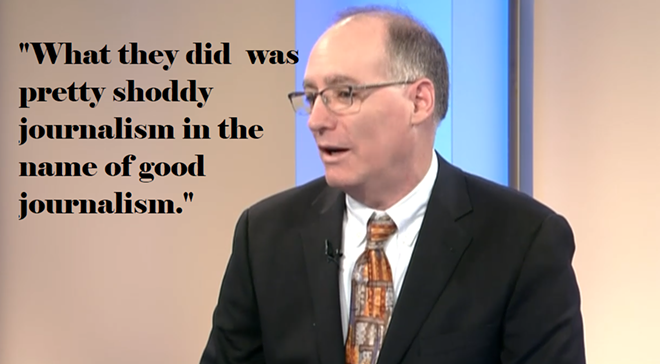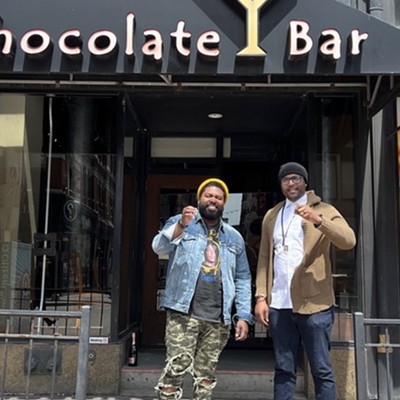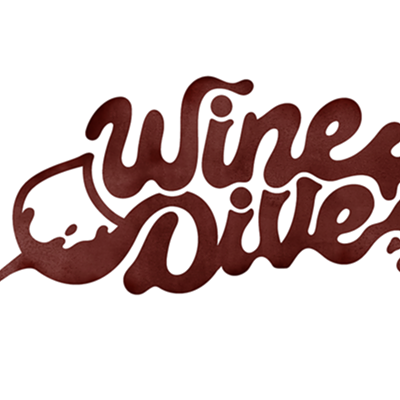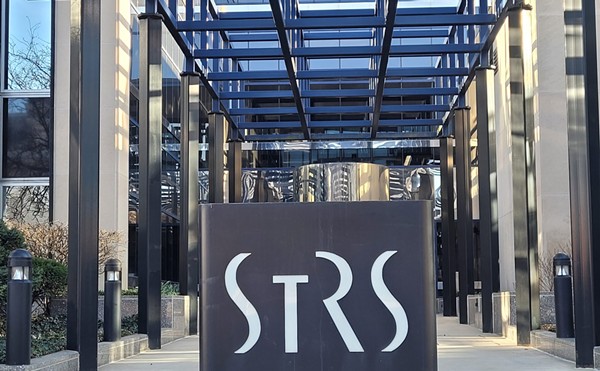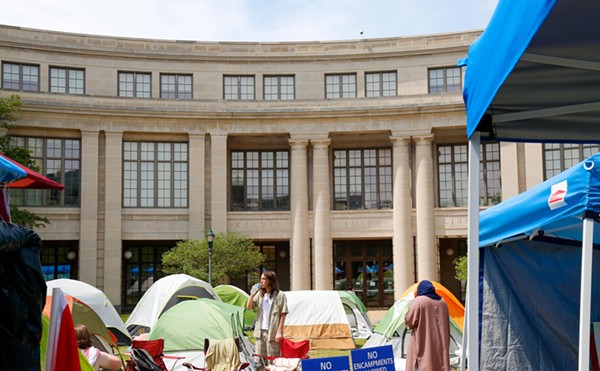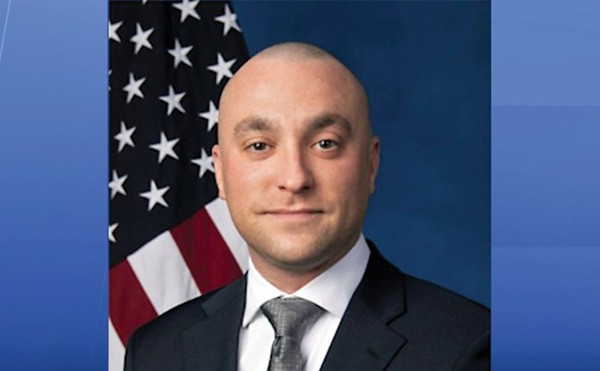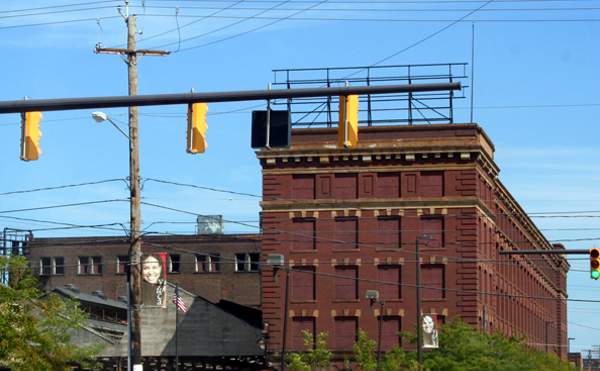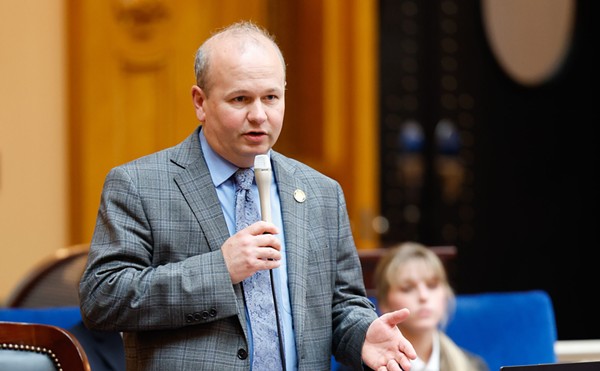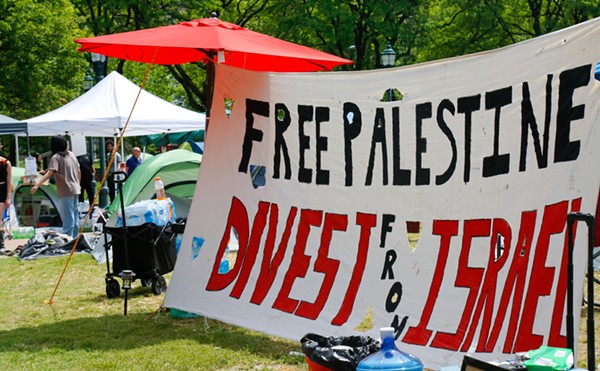Does Cleveland.com Editor Chris Quinn Hate Journalists as Much as it Sounds Like He Does?
By Sam Allard on Fri, Oct 12, 2018 at 6:29 pm
[
{
"name": "Ad - NativeInline - Injected",
"component": "38482495",
"insertPoint": "3",
"requiredCountToDisplay": "5"
},{
"name": "Real 1 Player (r2) - Inline",
"component": "38482494",
"insertPoint": "2/3",
"requiredCountToDisplay": "9"
}
]
Let us first digest, calmly and with open minds, Cleveland.com editor Chris Quinn's analysis of a journalism kerfuffle earlier this week. The basic gist was this: The city of Cleveland issued a "Rules of Engagement" memo to media covering Mayor Frank Jackson's State of the City Address, and local journalists responded.
The comments below are transcribed from Friday morning's Reporter's Roundtable on WCPN, archived and available for viewing on the Ohio Channel. (This portion begins at 6:23).
Chris Quinn: There was some controversy before the debate [sic] because the city put out a press release to the media — just to the media — saying Do's and Don'ts. And a couple of the don'ts were: 'Don't talk to people on the sidewalk' and 'Don't talk to the attendees inside,' which was ridiculous.
So I asked Bob Higgs, our City Hall reporter, as soon as it came out. 'Hey, call 'em. Ask if this is for real. And tell them if it's for real, we're writing a story, because it's illegal, and we're going to send all our reporters down to get arrested that night.'
And the city immediately said, 'No no no no no, we wrote that too strong. These are guidelines. We're not enforcing it.' Later though, some other journalists in town, without making the phone call, went to social media to report this as a big controversy. The Press Club put out a statement, you know, harrumphing and saying this is bad for journalism.
They should've made the phone call, because what they did was pretty shoddy journalism in the name of good journalism.
It's not a small point today. The media is under siege, from the president and elsewhere. We need to do our job to be accurate. And in this case, the word was spread that this horrible police state was being formed, and a simple phone call would have proven that's not the case. We kind of owe it to Cleveland to get that right. ...
All you needed to do was make a three-minute phone call, and we wouldn't have been... Of course it would've removed the chance for people to portray themselves as the heroes of journalism.
***
Quinn speaks with a great deal of authority, and on first listen, the statement might seem sensible, even persuasive. But it's a cruel and frankly shocking betrayal of the community he is the most powerful member of — that is, the Cleveland journalism community. In defiance of the values he purports to uphold, the statement also happens to be incredibly (and likely strategically) misleading.
A few contextual facts and corrections, then, the first few of which concern his distortion of the kerfuffle's timeline:
1) The city issued its initial "Rules of Engagement" memo Tuesday morning. I received mine at 10:22 a.m., though I know others received it earlier.
2) The city issued its amended memo, this time titled "Background Information..." at 4:52 p.m. Again, others may have received it slightly earlier than I did.
3) If Higgs called the city "as soon as [the original memo] came out" and the city "immediately" assured Cleveland.com that it had been worded way too strongly and that the controversial rules contained therein would not be enforced, it nevertheless waited several hours to alert other journalists — who were getting rightfully incensed on social media — of the errors.
4) It was not "later" that "some other journalists in town" — note Quinn's disdain — took to social media to "report this as a big controversy." It happened within minutes, as soon as many of us had received and read the email. We knew right away that this was an infringement on our rights and furthermore an extension of, rather than a departure from, the city's general hostility toward the press. PD reporter Rachel Dissell expressed the view that "this is another level of ridiculous" at 10:29 a.m. This was not reporting, per se, so much as it was an expression of disbelief and outrage.
5) The Press Club put out a statement the following morning, after the initial memo and its rules had already been walked back. In other words, there was no phone call to make by then. The Press Club wasn't adding fuel to some bogus or ill-begotten flame. It was advocating on behalf of journalists — its membership — expressing the frustration and anger that many of us had been feeling the previous day.
[I note (as an observation, not as an insult) that Quinn is likely just too out of touch with reporters in the trenches to understand why this was so offensive, so infuriating. He obviously had no clue that there were serious conversations about whether and how to respond, and that those conversations changed when the city's memo was revised.]
6) On Wednesday, then, the day of the SOTC, a few outlets reported on the situation. Scene, WKYC, WKSU all had short stories up on their websites. These were straightforward reports: The City had issued some controversial rules; after feedback — or, in my view, "under pressure" — the city had walked back those rules; the Press Club issued a statement expressing alarm and standing on a set of readily identifiable principles.
7) "Word was spread that this horrible police state was being formed." Nothing of the sort occurred. This is total bullshit hyperbole and Quinn knows exactly what he's doing. The only thing that made it so astonishing was hearing him say it in the same breath as, "We need to do our job to be accurate."
8) No one made any effort to portray themselves as heroes of journalism. In fact, most waited patiently for the official statement from the Press Club on Wednesday so that journalists could stand together, to speak with one voice.
I personally try to cut Quinn some slack sometimes, or at least try my best to interpret situations from his perspective, but when he makes comments like these — denigrating so-called "heroes of journalism" — I have to wonder what he's even doing in the industry.
Without giving him the satisfaction of prattling on at length, I'll add only that his conception of "good" and "shoddy" journalism to me seems backwards. Likewise his definition of accurate reporting as a counteroffensive to the forces laying siege to journalism.
It was instantly obvious to anyone who does actual reporting that the initial memo was an example of the media being under siege. Quinn himself acknowledges that the rules it outlined were not only "ridiculous" but "illegal." Illegal! So why on earth is it responsible journalistic practice to keep the memo secret — observe how he accepts and even reinforces the secrecy in the first paragraph above: "just to the media" — and to allow the city to say, "No no no no no, we don't plan to enforce these illegal rules."
What? This was not a rumor, for heaven's sake, which any good reporter would seek confirmation of before reporting as anything other than a rumor. This was an official press release. Which the mayor's communications team wrote. And distributed.
Are good journalists expected to read the minds of the marketing and communications personnel behind every press release we receive? Are we "good journalists" only if we make three-minute phone calls to get more precise translations of phrases like "don't walk across the street to engage with attendees standing in line" or "don't attempt to interview attendees inside Public Auditorium either before or after the Mayor’s address." Is it shoddy journalism to ask anything other than "is this for real?"
Why wouldn't it be for real? And since we're on the subject, Quinn and Higgs might be able to get Jackson or the media relations folks on the horn for a quick confirmation, but a bunch of us are stonewalled at every turn. We are asked to submit basic questions in writing. We are asked to submit basic questions as official public records requests. We are ignored and "no-comment"-ed so often that we resort to gambling on the wording of the refusals we receive to keep the civic heartache at bay. Sarah Koenig, on the Serial podcast, said in last week's episode that not a single member of the Mayor's administration agreed to an on-record interview. "I've frankly never encountered a city government with a jaw locked up tighter than Cleveland’s” she said, to more than a million national listeners. So why wouldn't the city think it could dictate the behavior, agenda and even physical movement of local reporters?
And with friends like Quinn, why wouldn't it think it could do so with impunity?
The comments below are transcribed from Friday morning's Reporter's Roundtable on WCPN, archived and available for viewing on the Ohio Channel. (This portion begins at 6:23).
Chris Quinn: There was some controversy before the debate [sic] because the city put out a press release to the media — just to the media — saying Do's and Don'ts. And a couple of the don'ts were: 'Don't talk to people on the sidewalk' and 'Don't talk to the attendees inside,' which was ridiculous.
So I asked Bob Higgs, our City Hall reporter, as soon as it came out. 'Hey, call 'em. Ask if this is for real. And tell them if it's for real, we're writing a story, because it's illegal, and we're going to send all our reporters down to get arrested that night.'
And the city immediately said, 'No no no no no, we wrote that too strong. These are guidelines. We're not enforcing it.' Later though, some other journalists in town, without making the phone call, went to social media to report this as a big controversy. The Press Club put out a statement, you know, harrumphing and saying this is bad for journalism.
They should've made the phone call, because what they did was pretty shoddy journalism in the name of good journalism.
It's not a small point today. The media is under siege, from the president and elsewhere. We need to do our job to be accurate. And in this case, the word was spread that this horrible police state was being formed, and a simple phone call would have proven that's not the case. We kind of owe it to Cleveland to get that right. ...
All you needed to do was make a three-minute phone call, and we wouldn't have been... Of course it would've removed the chance for people to portray themselves as the heroes of journalism.
***
Quinn speaks with a great deal of authority, and on first listen, the statement might seem sensible, even persuasive. But it's a cruel and frankly shocking betrayal of the community he is the most powerful member of — that is, the Cleveland journalism community. In defiance of the values he purports to uphold, the statement also happens to be incredibly (and likely strategically) misleading.
A few contextual facts and corrections, then, the first few of which concern his distortion of the kerfuffle's timeline:
1) The city issued its initial "Rules of Engagement" memo Tuesday morning. I received mine at 10:22 a.m., though I know others received it earlier.
2) The city issued its amended memo, this time titled "Background Information..." at 4:52 p.m. Again, others may have received it slightly earlier than I did.
3) If Higgs called the city "as soon as [the original memo] came out" and the city "immediately" assured Cleveland.com that it had been worded way too strongly and that the controversial rules contained therein would not be enforced, it nevertheless waited several hours to alert other journalists — who were getting rightfully incensed on social media — of the errors.
4) It was not "later" that "some other journalists in town" — note Quinn's disdain — took to social media to "report this as a big controversy." It happened within minutes, as soon as many of us had received and read the email. We knew right away that this was an infringement on our rights and furthermore an extension of, rather than a departure from, the city's general hostility toward the press. PD reporter Rachel Dissell expressed the view that "this is another level of ridiculous" at 10:29 a.m. This was not reporting, per se, so much as it was an expression of disbelief and outrage.
5) The Press Club put out a statement the following morning, after the initial memo and its rules had already been walked back. In other words, there was no phone call to make by then. The Press Club wasn't adding fuel to some bogus or ill-begotten flame. It was advocating on behalf of journalists — its membership — expressing the frustration and anger that many of us had been feeling the previous day.
[I note (as an observation, not as an insult) that Quinn is likely just too out of touch with reporters in the trenches to understand why this was so offensive, so infuriating. He obviously had no clue that there were serious conversations about whether and how to respond, and that those conversations changed when the city's memo was revised.]
6) On Wednesday, then, the day of the SOTC, a few outlets reported on the situation. Scene, WKYC, WKSU all had short stories up on their websites. These were straightforward reports: The City had issued some controversial rules; after feedback — or, in my view, "under pressure" — the city had walked back those rules; the Press Club issued a statement expressing alarm and standing on a set of readily identifiable principles.
7) "Word was spread that this horrible police state was being formed." Nothing of the sort occurred. This is total bullshit hyperbole and Quinn knows exactly what he's doing. The only thing that made it so astonishing was hearing him say it in the same breath as, "We need to do our job to be accurate."
8) No one made any effort to portray themselves as heroes of journalism. In fact, most waited patiently for the official statement from the Press Club on Wednesday so that journalists could stand together, to speak with one voice.
I personally try to cut Quinn some slack sometimes, or at least try my best to interpret situations from his perspective, but when he makes comments like these — denigrating so-called "heroes of journalism" — I have to wonder what he's even doing in the industry.
Without giving him the satisfaction of prattling on at length, I'll add only that his conception of "good" and "shoddy" journalism to me seems backwards. Likewise his definition of accurate reporting as a counteroffensive to the forces laying siege to journalism.
It was instantly obvious to anyone who does actual reporting that the initial memo was an example of the media being under siege. Quinn himself acknowledges that the rules it outlined were not only "ridiculous" but "illegal." Illegal! So why on earth is it responsible journalistic practice to keep the memo secret — observe how he accepts and even reinforces the secrecy in the first paragraph above: "just to the media" — and to allow the city to say, "No no no no no, we don't plan to enforce these illegal rules."
What? This was not a rumor, for heaven's sake, which any good reporter would seek confirmation of before reporting as anything other than a rumor. This was an official press release. Which the mayor's communications team wrote. And distributed.
Are good journalists expected to read the minds of the marketing and communications personnel behind every press release we receive? Are we "good journalists" only if we make three-minute phone calls to get more precise translations of phrases like "don't walk across the street to engage with attendees standing in line" or "don't attempt to interview attendees inside Public Auditorium either before or after the Mayor’s address." Is it shoddy journalism to ask anything other than "is this for real?"
Why wouldn't it be for real? And since we're on the subject, Quinn and Higgs might be able to get Jackson or the media relations folks on the horn for a quick confirmation, but a bunch of us are stonewalled at every turn. We are asked to submit basic questions in writing. We are asked to submit basic questions as official public records requests. We are ignored and "no-comment"-ed so often that we resort to gambling on the wording of the refusals we receive to keep the civic heartache at bay. Sarah Koenig, on the Serial podcast, said in last week's episode that not a single member of the Mayor's administration agreed to an on-record interview. "I've frankly never encountered a city government with a jaw locked up tighter than Cleveland’s” she said, to more than a million national listeners. So why wouldn't the city think it could dictate the behavior, agenda and even physical movement of local reporters?
And with friends like Quinn, why wouldn't it think it could do so with impunity?
SCENE Supporters make it possible to tell the Cleveland stories you won’t find elsewhere.
Become a supporter today.
About The Author
Sam Allard
Sam Allard is the Senior Writer at Scene, in which capacity he covers politics and power and writes about movies when time permits. He's a graduate of the Medill School of Journalism at Northwestern University and the NEOMFA at Cleveland State. Prior to joining Scene, he was encamped in Sarajevo, Bosnia, on an...
Scroll to read more Cleveland News articles
Newsletters
Join Cleveland Scene Newsletters
Subscribe now to get the latest news delivered right to your inbox.

